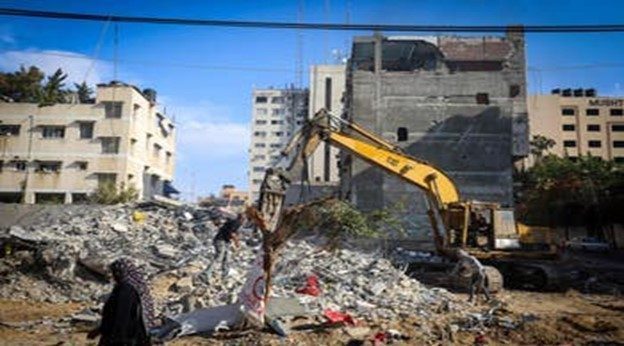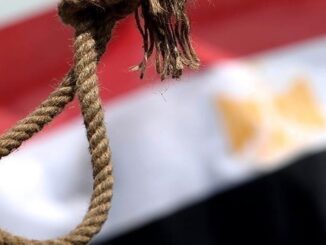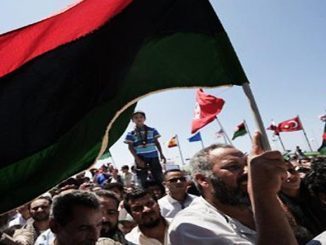
An Israeli report says Egypt’s role in Gaza reconstruction works ‘bolsters Israel’s strategy of keeping Gaza and the West Bank separated, blocking a diplomatic solution’
The huge billboards bearing a picture of Egypt’s Abdel-Fattah al-Sisi decorate the coastal road up and down the Gaza Strip. A few weeks after Israel’s war on Gaza in May and the talks between Hamas, Israel and Egypt, dozens of Egyptian bulldozers rolled in, accompanied by around 70 engineers and construction workers, targeting the reconstruction of the strip, says Zvi Bar’el, the Middle Eastern affairs analyst of Haaretz Israeli newspaper, in an analysis published on 27 November 2021, Zvi Bar’el’s analysis continues, stating:
First they removed the ruins of the demolished buildings that remained after the Israeli airstrikes. Trucks filled with gravel and tar repaved two main streets. Later, the Egyptians are supposed to help build more roads as part of a pledged $500 million donation for rebuilding Gaza.
The main beneficiary of the reconstruction plan is the company Beni Sinai, owned by Bedouin businessman Ibrahim al-Arjani, who also heads the Tarabin Bedouin tribe and the association of the tribe’s leaders in northern Sinai – which are cooperating with Egyptian intelligence in its war against the “terrorist” groups in the Sinai Peninsula. Arjani, who owns some of the largest construction firms in Egypt, takes his orders from Egyptian intelligence – and also a big cut of Egypt’s aid to Gaza, and from the movement of goods from Egypt into Gaza, mostly those that pass through the Saladin checkpoint in Rafah, says Bar’el, continuing his analysis as follows:
Egypt has a monopoly over more than just the initial rebuilding efforts. With the consent of Israel, the United States and the United Arab Emirates, Qatar has agreed to a new arrangement for transferring its aid: Qatar will pay Egypt for oil and gasoline that Egypt will give to Hamas, and Hamas will sell the gasoline to gas stations in Gaza.
The proceeds will go to underprivileged families and to pay the salaries of government employees in Gaza. This complicated arrangement came about because Israel didn’t want Qatar handing over cash-filled suitcases to Hamas and then have Hamas give the money to around 100,000 families in need. Israel didn’t want this because it claims Hamas uses part of the money for military purposes.
Israel is tired of the photos of the cash-filled suitcases. Israel wants to prove it isn’t aiding Hamas – as long as the group refuses to release the Israeli captives and bodies of soldiers it’s holding. This was a promise by Defense Minister Benny Gantz, who decided that the reconstruction of Gaza would depend on getting the Israelis released.
But Gantz also realized that this condition was unrealistic, especially after talks in which Egyptian and American officials explained to Gantz that preventing aid from reaching Gaza could lead to another round of fighting and threaten Egypt’s ability to serve as a mediator.
Egypt proposed to be the indirect courier for the Qatari aid money, which would be set at around $30 million a month. But in the past this sum was divided three ways. One part was paid out directly to poor families, another was for buying diesel fuel for the Gaza power plant, and the third was for projects to create jobs and lower unemployment that has now topped 60 percent.
Egypt and Qatar might have promised that the money won’t be used for arming Hamas, but there is no effective oversight mechanism to prevent Hamas from taking its share of the proceeds from selling the oil and gasoline in Gaza.
Israel tried to get the UAE to be the sponsor instead of Qatar, but was told no. The UAE made clear that it will help rebuild Gaza only if Egypt is in charge – a position agreed on by the Emirates, Jordan and Saudi Arabia back in May when UAE ruler Mohammed bin Zayed met for a few hours with Jordan’s King Abdullah at the Amman airport.
Along with the reconstruction work, Egypt is the supplier of building materials and consumer goods that enter Gaza through the Saladin crossing, where 17 percent of goods entering Gaza pass. The trade through this crossing is worth $55 million a month, from which Hamas takes about $14 million in fees and customs.
The paradox is that the greater the imports passing through Egypt, the more the Palestinian Authority loses in revenues – because the PA has the right to the customs duties paid on goods entering Gaza through Israel.
Thus, even though Prime Minister Naftali Bennett and Gantz are trying to convince the donor countries to help the PA, which is on the verge of economic collapse, they’re eating away at its revenues. One time it’s Israel deducting from the customs money Israel collects for the Palestinians; Israel deducts this as part of the law to halt the PA’s payments to families of detainees in Israeli prisons. Another time it’s by replacing trade between Israel and Gaza with trade via Egypt.
Egypt has also increased the number of guards along its border with Gaza, and is heavily pressuring Hamas to seal a deal with Israel swapping prisoners and bodies. In October, Hamas leaders were invited to Egypt to discuss a swap, and it seemed understandings were reached to launch the process.
But Israel wasn’t impressed by Hamas’ concessions, Palestinian sources said. Israeli officials told Haaretz that these weren’t really concessions but a rephrasing of still unacceptable conditions. It turned out that, despite Israel’s conditions linking a prisoner swap to rebuilding Gaza, the Qatari money would continue to enter Gaza and Egypt would continue with its reconstruction work.
The question of rebuilding Gaza isn’t divorced from the policies of the Biden administration, which has admitted that for now a comprehensive peace process has no “political feasibility.” But the administration still believes that the economy in the West Bank and Gaza must be improved.
According to foreign diplomats, the United States will be willing to contribute generously to Gaza’s reconstruction in return for a long-term cease-fire accompanied by guarantees that no party will take action that could hinder the reconstruction.
To translate this principled position into reality, Egypt is trying to reach understandings with Hamas on fundamental issues – the main one is completing the reconciliation between Hamas and Fatah. Egypt has presented Hamas with a draft of an arrangement, based on talks between Egyptian intelligence and Hamas leaders, according to Taher al-Nunu, the media adviser to Hamas leader Ismail Haniyeh.
It’s still too early to estimate Egypt’s chances of success in promoting reconciliation, especially as Palestinian President Mahmoud Abbas seeks a peace process with Israel. This week he asked Russian President Vladimir Putin to call for a meeting of the Quartet – of which Russia is a member along with the United States, the European Union and the United Nations – to revive the peace process.
This follows Abbas’ ultimatum to Israel at the UN General Assembly in New York in September. Abbas said Israel has a year to complete talks and withdraw from the territories, or the PA will ask the International Court of Justice to force Israel to withdraw. For now it doesn’t seem that Israel is taking the threat too seriously, especially amid Washington’s stance and Putin’s apparent lack of interest in the Israeli-Palestinian conflict.
Until Hamas and Fatah reconcile, Egypt will try to convince Hamas to allow the presence – even if only symbolically – of PA representatives in Gaza. This would show that its reconstruction efforts aren’t being conducted only with Hamas, and that Egypt is acting according to previous agreements that require the presence of PA customs officials at the crossings with Egypt.
Egypt is also careful that all its reconstruction work in Gaza is done through Arjani’s company – not by the Egyptian army – even if the army is supervising the work. Egypt is also letting the company sign agreements with building contractors from Gaza without Cairo being “tainted” by direct economic cooperation with Hamas.
In this way, Egypt can also utilize financing from Saudi Arabia and the UAE, which for now don’t want any direct contact with Hamas, though they’re willing to help Egypt preserve its monopoly controlling Gaza.
Expanding Egypt’s hold in Gaza also sits well with Israeli policy, which considers the Strip a separate entity – and in doing so guarantees the unfeasibility of a peace agreement.
According to this view, as long as there is no unified Palestinian representation, Israel doesn’t have a Palestinian partner, so it can’t be blamed for not finding a reason for negotiating. Prime facie, this position contradicts the Egyptian approach that promotes reconciliation between Hamas and Fatah, whose result is supposed to be a general election in all the Palestinian territories – an election that Hamas could very well win.
But Israel has learned that it can always rely on Abbas to fulfill his role as the protector of Israel – after he canceled the May election and still hasn’t set a new date. Israel can always prevent the holding of elections in Jerusalem, while the deep rift between Hamas and Fatah serves its purposes.
Egypt isn’t blind to the Israeli considerations and is no longer calling for a comprehensive solution to the conflict. One “modest” goal is to establish a long-term cease-fire that will include Hamas’ total responsibility for all arms found in Gaza, including those that other organizations hoard. The other is to stop Hamas’ military resistance in the West Bank and East Jerusalem to ensure Gaza’s reconstruction and Hamas’ economic survival.
But according to the responses from Hamas spokesmen, even these demands aren’t easy to swallow. Hamas doesn’t have full control over other factions, its operations in Jerusalem and the West Bank have ramped up since the war on Gaza in May, and Hamas is convinced that its deterrence against Israel has been bearing economic benefits such as the aid it receives from Egypt and Qatar. And this is the only thing that can help it carry out Gaza’s reconstruction, the Middle Eastern affairs analyst of Haaretz Zvi Bar’el concludes.



